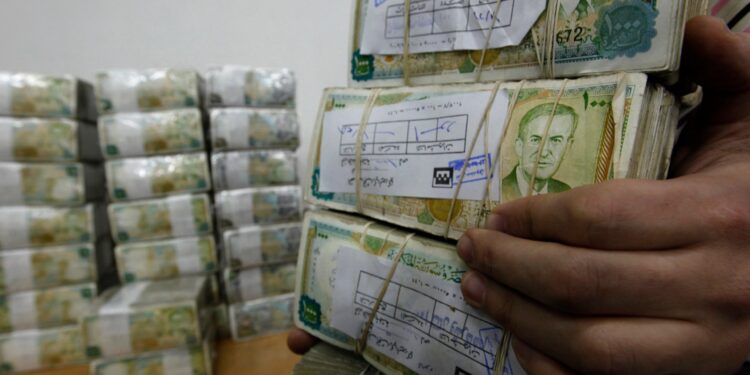The Syrian pound stabilized against the dollar in the transactions of the Central Bank of Syria on Sunday, according to its bulletin issued today, while the exchange rate of the lira declined slightly against the dollar in parallel market transactions.
This comes after an increase that continued for several days until the end of last week, with the US Treasury Department announcing last week facilities (an exception to the imposed sanctions) allowing the transfer of personal funds to Syria, and a French minister indicating the possibility of lifting the sanctions on Damascus quickly.
Parallel market transactions
- The exchange rate of the Syrian pound against the dollar in Damascus and Aleppo fell to 11,100 pounds against the dollar for purchase from the level of 11,000 in yesterday’s transactions, while the selling price fell to 11,400 pounds from 11,200 pounds to the dollar yesterday.
- In Idlib (northwestern Syria), the exchange rate of the Syrian pound fell today, Sunday, when buying, to 11,250 pounds from the level of 11,000 yesterday, while the selling price fell to 11,450 pounds from 11,200 pounds to the dollar.
- In Al-Hasakah (northeastern Syria), the lira fell to 11,300 liras against the dollar when buying from 11,000 recorded yesterday, and the selling price rose to 11,500 liras from 11,200 recorded yesterday.
At the Central Bank, the exchange rate of the Syrian pound stabilized today, Sunday, at 13,000 for purchase against the dollar, while it recorded 13,130 pounds for sale against the green note (dollar).
Factors affecting the performance of the lira
- French Foreign Minister Jean-Noel Barrot said last week that European Union sanctions on Syria that are hampering the delivery of humanitarian aid and the country’s recovery could be lifted quickly.
- The Syrian Minister of Trade in the Syrian caretaker government, Maher Khalil Al-Hassan, stated – in an interview with Al Jazeera Net – that customs duties in most of them will witness a decline, perhaps reaching more than 50% or 60% in some of them, stressing that this will reflect directly and positively on Prices of goods in the markets.
- Last week, the US Treasury issued a license to Syria (an exception to sanctions) allowing transactions with government institutions and some energy transactions, and allowing the transfer of personal funds to Syria, including through the Syrian Central Bank.
- Caretaker Finance Minister Muhammad Aba Zeid told Al Jazeera that the foreign debt ranged between $20 and $23 billion, in addition to “billions in domestic debt,” and added that they inherited “a dilapidated state with empty coffers and huge debts,” and that the Assad regime had “no records.” You can return to it.”
- Economy Minister Basil Abdel Hanan spoke to Al Jazeera Net, earlier last month, about a plan regarding the lira, saying that the main goal is first to stabilize the exchange rate in order to stabilize the markets and move the wheel of trade exchange.
Abdel Hanan added that in the future, as the wheel of production moves and exports begin, there will be steps that raise the value of the lira, but the current reality requires great efforts in addition to the concerted efforts of all efforts.
He explained that the most important factor for strengthening the lira is production and export to introduce hard currency and increase the cash reserve, thus increasing the strength of the currency, as well as achieving stability in the exchange rate to stabilize the movement of commercial and monetary circulation.



